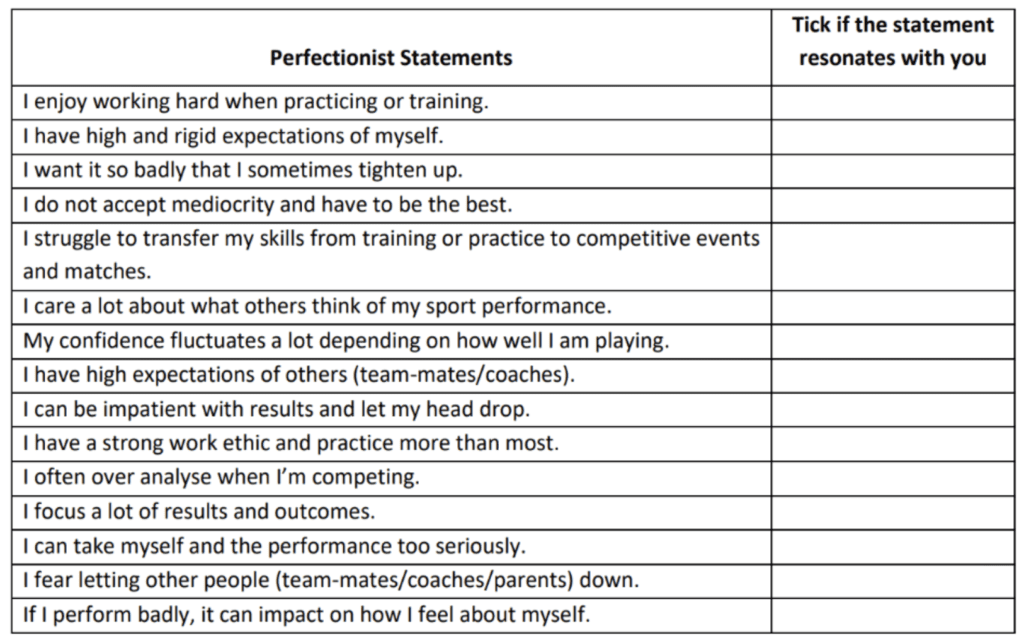19 May 2023

Helping You Gain A Mental Edge
10 Steps to Help You Accept Perfection Isn’t Required to Perform at Your Best
Does Trying to Be Perfect In Your Sport Help You Perform Better?
Perfectionism in sport can be advantageous for some athletes and it can be fatal for others quashing their enjoyment and meaning that they’ll never reach their potential. Those athletes with perfectionist tendencies in my opinion, first need to be aware that they do fall into this trap. They also need to be aware of the positives and negatives surrounding perfectionism and work out ways to ensure that they don’t get sucked into bad habits.
In this week’s mental edge, we’re going to help you with this.
Step 1: I’d like you to read and tick if you feel the statements below are true for you.

Step 2: Total the number of ticks that you have noted down. If you scored more than EIGHT I’d recommend that your mental approach “needs some attention,” so please make sure you read and have a pencil handy for steps 3 and 4.
Step 3: Now scan your ticks and the relevant statements and consider the advantages and disadvantages of this style that you adopt. For example, perhaps you ticked to “I have a strong work ethic and practice more than most.” The advantage is that your coaches will be happy, you’ll learn new skills quicker than a lot of people. Perhaps the disadvantages are that you practice out of a lack of trust, or you may become obsessed with ensuring that your technique is perfect especially in the run up to a big match or competition.
Step 4: This is your time now to think about setting some new rules and boundaries to ensure that you can play with a sense of freedom and confidence. For example, a professional footballer who struggled to trust himself and his skills on match day, and someone I supported in the past said to himself I will work for an extra 30 minutes x 3 per week after training, no more and I will walk away at that point regardless if those extras have gone well or not. Similarly, a talented golfer I had the opportunity to work with decided to trial taking a recovery day, the day before big tournaments as he was spent mentally by the time big tournaments started in the past and often underperformed. He ensured most of his preparation was done well ahead of the event and that he didn’t get sucked into being reactive like many golfers do, who are coached to feel that their golf swing must be perfect for them to perform well.
QUOTE OF THE WEEK

Step 5: Most athletes don’t enjoy making mistakes, I haven’t met one yet who does! Yet, the perfectionists relationship with mistakes is different and can often be hugely detrimental to a having a healthy mindset because of the level of self-criticism that they experience. So why not gain some valuable insights on how you could deal better with mistakes and not be so hard on yourself by listening to this week’s Demystifying Mental Toughness Podcast.
Step 6 – If you are someone who enjoys listening to podcasts here are some other ideas to overcome perfectionism where I share 3 episodes of the Demystifying Mental Toughness Podcast as well as 2 other shows.
Ep130 David Charlton – How to Deal with Self-Criticism using Self Compassion – PT2
Ep131 David Charlton – How to Deal with Self-Criticism using Self Compassion – FINAL PART
Ep142: Alessia Bruno – Is Striving for Perfection a Good Thing in Gymnastics?
Ep146 – The Sport Psych Show with Dr Andy P Hill – Perfectionism in Sport
The Sports Psychology Podcast with Patrick Cohn – Perfectionism in Sports and Life
Step 7 – You could read our blogs on perfectionism where we share many different approaches and helpful ideas to support you.
5 Ways To Create A Psychological Safe Sporting Environment
Are You A Rugby Player With Perfectionist Tendencies?
How to Trust Your Skills When You’re a Goalkeeper
How to Help Children Overcome Fear of Failure
How To Play Well When You Aren’t Feeling Great
Step 8 – This resource is a helpful one for supporting children who can let their emotions get the better of them when they make mistakes.
Conversations with Kids – Dealing with Criticism
Step 9 – For amazing resources and insights on self-compassion and how to be kinder to yourself see world leading author and researcher, Kristin Neff’s work.
Kristin Neff Website on Self-Compassion
Step 10: Our posts on Instagram this week have received a lot of engagement in relation to being kinder to yourself and dealing better with difficulties where we’ve shared many tips, quotes and journal prompts.
3 WAYS TO LEARN MORE ABOUT OUR WORK:

Best Wishes
David Charlton
Online Sports Psychologist | Mental Performance Coach who supports many highly motivated athletes, young and old, developing their skills or who are already highly skilled so that they gain a mental edge and get the most from their talent across the globe from USA/Canada to Great Britain and Ireland to UAE, South Africa, Australia and New Zealand, using ONLINE Video Conferencing.
Managing Director – Inspiring Sporting Excellence
Host of Demystifying Mental Toughness Podcast
Founder of The Sports Psychology Hub
Author of The Mental Edge
With over a decades’ experience supporting athletes, coaches, parents and teams to transfer their skills from training to competitive situations, under pressure.
T: +44 7734 697769






